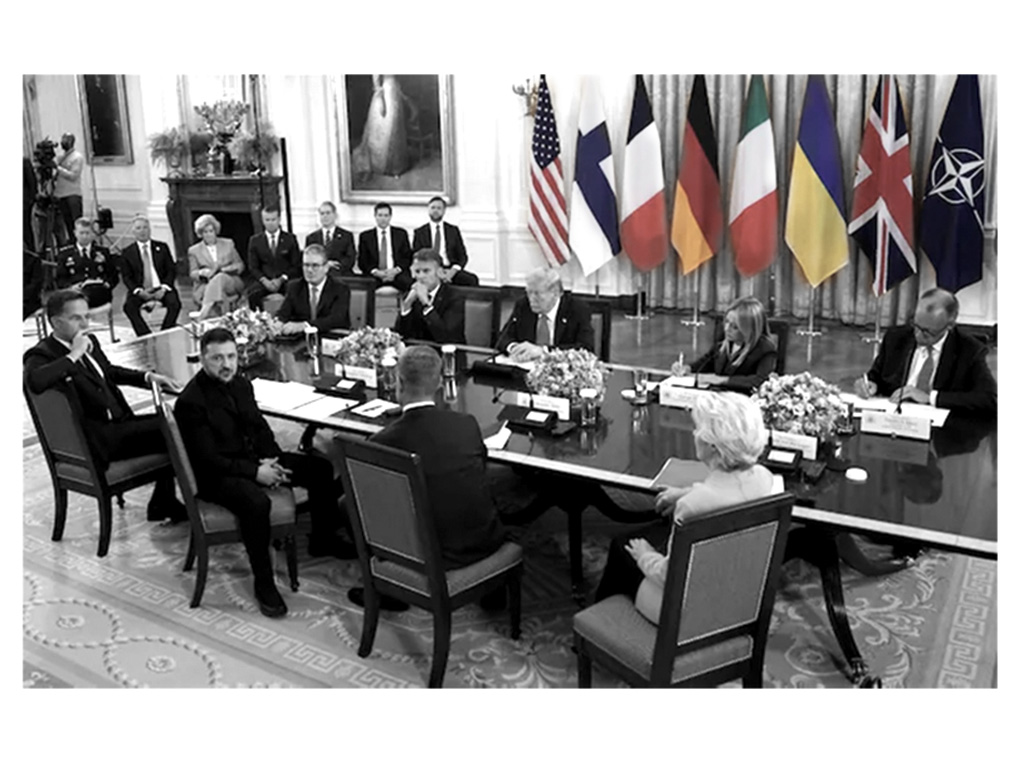Trump Hosts European Leaders and Zelenskyy in Washington: A Pivotal Moment in the Ukraine War
Washington, D.C. – In a high-stakes White House summit, U.S. President Donald Trump convened with Ukrainian President Volodymyr Zelenskyy and key European leaders including UK Prime Minister Keir Starmer, French President Emmanuel Macron, German Chancellor Friedrich Merz, European Commission President Ursula von der Leyen, and Italian Prime Minister Giorgia Meloni. The summit was widely regarded as a turning point in the ongoing war in Ukraine, with leaders balancing the urgent call for peace against the imperative of European security.
Conspicuously absent was Poland. Neither President Andrzej Duda nor Prime Minister Donald Tusk attended, despite Poland’s central role in supporting Ukraine. Officials confirmed Warsaw had no representation at the summit, underscoring possible fractures in European unity at a critical moment.
Trump: “We Will Give Them Very Good Protection”
President Donald Trump set the tone, reaffirming America’s commitment to Ukraine’s defense: “We will give them very good protection.” His remarks highlighted a shift from previous skepticism about NATO, signaling a willingness to engage in Ukraine’s security architecture while stopping short of endorsing Kyiv’s full NATO membership.
Zelenskyy: “A Very Good Conversation”
President Volodymyr Zelenskyy described his private talks with Trump as productive yet sensitive: “We spoke about very sensitive points… a very good conversation.” Zelenskyy emphasized that Ukraine’s priority remains security guarantees and the return of Ukrainian children taken to Russia, framing the conflict not only as geopolitical but as deeply humanitarian.
Starmer: “A Historic Step Forward”
UK Prime Minister Keir Starmer, attending his first major U.S. summit as leader, framed the talks in historic terms: “A historic step… a really important step forward in terms of security for Ukraine and security in Europe.” His remarks underscored Britain’s role in bridging U.S. and European positions, while keeping NATO cohesion intact.
Macron: Warning Against Appeasement
French President Emmanuel Macron cautioned against short-term fixes that might embolden Moscow. He stressed the urgency of a ceasefire but warned: “Appeasing Russia could lead to long-term insecurity in Europe.” Macron’s message reflected French concerns that an unbalanced peace could fracture Europe’s security order.
Merz: Push for Ceasefire
German Chancellor Friedrich Merz pressed for urgency in halting the fighting: “We must aim for a ceasefire from the next meeting.” His direct call reflected Germany’s position as both an economic powerhouse and a nation heavily impacted by the war’s energy and refugee consequences.
Von der Leyen: Humanitarian Priorities
European Commission President Ursula von der Leyen emphasized humanitarian imperatives: the return of Ukrainian children held in Russia and relief for war-torn communities. “We must bring back the children and end this war,” she urged, framing the conflict as both a moral and geopolitical crisis.
Meloni: Strong Warning to Putin
Italian Prime Minister Giorgia Meloni delivered a pointed message to Russian President Vladimir Putin during the summit, emphasizing Italy’s unwavering support for Ukraine and the necessity of holding Russia accountable for its actions. She stated, “We must bring back the children and end this war,” underscoring the humanitarian crisis and Italy’s commitment to Ukraine’s sovereignty. Meloni’s remarks highlighted the European consensus on the need for a firm stance against Russian aggression. Source: AINvest
Why Poland’s Absence Matters
Poland has been one of Ukraine’s staunchest supporters since the beginning of Russia’s full-scale invasion, hosting millions of refugees and pushing NATO for stronger deterrence. Its absence at this pivotal meeting raised eyebrows across Europe. Some analysts suggested Warsaw was sidelined by larger powers, while others viewed it as a missed opportunity for Poland to assert its influence in shaping the next phase of the conflict. (Reuters coverage)
Looking Ahead
The summit ended without a formal peace deal, but leaders signaled that negotiations would continue. With Trump promising protection, Zelenskyy seeking concrete guarantees, and European leaders divided between urgency and caution, the road ahead remains uncertain. What is clear: the Washington summit marked a critical juncture in the war, with global security hanging in the balance.
FAQ: Key Takeaways from the Washington Summit
- Did Poland attend the Ukraine summit in Washington? No, neither President Duda nor Prime Minister Tusk were present.
- What did Trump promise Ukraine? Trump vowed: “We will give them very good protection.”
- What did Zelenskyy emphasize? He called the talks “very good” and pressed for security guarantees and the return of children taken to Russia.
- What divides Europe’s leaders? Macron warns against appeasement, while Merz pushes urgently for a ceasefire.
- What comes next? Follow-up meetings are expected, with growing pressure for a framework ceasefire agreement.
